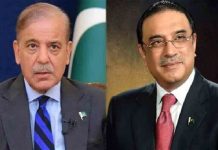DM Monitoring
WASHINGTON: Pakistan is monitoring the ability of the new Taliban government in Afghanistan to deliver on commitments and promises to uphold human rights that they have made to the international community before extending recognition to it, Pakistan’s Ambassador to the United States Asad Majeed Khan has said. “Whether the Taliban actually abide by those (commitments) is their call,” the Pakistani envoy said in an interview with The Washington Diplomat. “But we have basically laid out our expectations, which is that we want the rights of everyone to be respected,” he said when asked under what conditions Pakistan would recognise the Taliban government.
“We want that Afghan territory not be used against any other country, including Pakistan. We want human rights and women’s rights to be preserved.” At the same time, Ambassador Khan said Pakistan believed that “instead of indulging in give-and-take on these issues, right now what’s really important is to avert a humanitarian crisis.” What was really important at the moment was to “basically not let things fall apart”, he said, adding “clearly, there is a new reality, which is a government under the Taliban.”
“The international community has to make a choice: between engaging, and that doesn’t necessarily mean recognition, and abandonment.” Replying to a question about Pakistan-US ties, he said since 9/11, Pakistan has essentially been seen through the prism of Afghanistan. “I can tell you that today, we are together on the same side in terms of our interests and expectations in Afghanistan. The US wants to see the conflict end; that’s also what we want. And we would like to see that the gains Afghanistan has made over the last few decades are preserved.”
Asked about the impression in the US that Pakistan supported extremist groups, Ambassador Khan said the facts needed to be looked at more closely. “Pakistan has been a close partner and ally in decimating Al Qaeda, and in bringing about the peace negotiations (on Afghanistan),” he said, asserting that it was unfortunate that Pakistan was associated with a lot of negative news.
The ambassador’s response came after the US State Secretary Antony Blinken said that US will be looking at its relationship with Pakistan in the coming weeks on the basis of what role Washington would want Islamabad to play in the future of Afghanistan. Testifying before Congress on the Taliban victory in Afghanistan, Blinken heard from lawmakers across party lines who pushed for a harder line on Pakistan. Blinken told the House of Representatives Foreign Affairs Committee that Pakistan has a “multiplicity of interests, [with] some that are in conflict with ours”.
“It is one that is involved hedging its bets constantly about the future of Afghanistan, it’s one that’s involved harbouring members of the Taliban. It is one that’s also involved in different points of cooperation with us on counterterrorism,” Blinken said. Asked by lawmakers if it is time for Washington to reassess its relationship with Pakistan, Blinken said the administration would soon be doing that. “This is one of the things we’re going to be looking at in the days, and weeks ahead, the role that Pakistan has played over the last 20 years but also the role we would want to see it play in the coming years and what it will take for it to do that,” he said.
Blinken also called on Pakistan to deny legitimacy to the Afghan Taliban unless they meet international demands. “What we have to look at is an insistence that every country, to include Pakistan, make good on the expectations that the international community has of what is required of a Taliban-led government if it’s to receive any legitimacy of any kind or any support,” Blinken said.
He said the priorities included ensuring the Taliban let out people who want to leave Afghanistan and respect the rights of women, girls and minorities, as well as adhere to promises that the country not again become “a haven for outward-directed terror”.
“So Pakistan needs to line up with a broad majority of the international community in working toward those ends and in upholding those expectations,” Blinken said. Democratic Representative Joaquin Castro, one of several lawmakers to criticise Pakistan, called on the United States to consider removing its status as a major non-Nato ally, which gives Islamabad privileged access to US weaponry.
The United States’ withdrawal from Afghanistan culminated with a hastily organised airlift that left thousands of US-allied Afghans behind and was punctuated by a suicide bombing outside Kabul’s airport that killed 13 US troops and more than 80 Afghans. The United States and Western countries are in a difficult balancing act in the aftermath of the Taliban’s victory, reluctant to recognise the group while accepting the reality that they will have to engage with them to prevent a looming humanitarian crisis.




